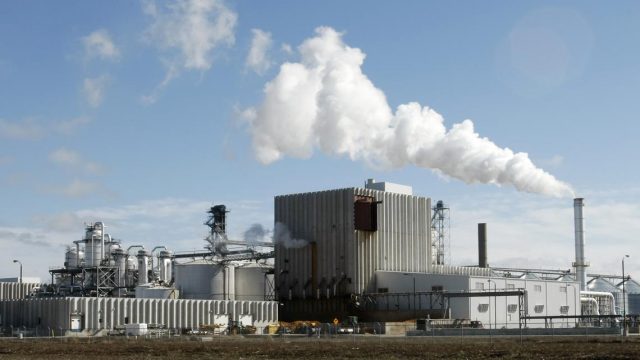Ethanol’s Struggles as Government Eases Mandates Should Make Farm Country Very, Very Scared

Ethanol policy is an absolute disaster waiting to happen.
It’s a ticking time bomb, waiting to blow up in our collective faces.
The government’s promotion of ethanol has created a very large market for American farmers – corn farmers, specifically – to sell their crops into.
Corn is, by a country mile, America’s #1 crop.
Almost all of the ethanol produced in the United States – about 95 percent – comes from corn.
In 2018 some 5.6 billion bushels of corn was used for ethanol production, which was more than 27 percent of the country’s entire corn production:
This growth in ethanol production and demand for ethanol crops is the result of a myriad of government policies from subsidies and trade protectionism to use mandates.
What happens when the government eases up?
The ethanol market crashes.
“Ethanol industry struggles under current policies,” is a recent headline from Forum News Service reporter Keith Norman.
From his article:
Richman said the Renewable Fuel Act requires refineries to include ethanol or other renewable fuels in the vehicle fuels it produces unless they apply for and receive an exemption. Exemptions can be granted if meeting the standards would create a financial hardship for the refinery.
“During the Obama administration a handful of exemptions were granted any given year,” Richman said. “It wasn’t until the Trump administration, with Scott Pruitt administrator of the EPA (Environmental Protection Agency) that it became a problem. Between 2016 and 2018, they retroactively granted exemptions to 85 facilities, eliminating demand for 4 billion gallons of ethanol.”
In 2018, American ethanol plants produced 16 billion gallons of the world’s 28 billion gallon output.
To summarize, the federal government is cutting back on its mandate that refiners use ethanol in their fuel blends. Per the article, the waivers issued so far amount to about a quarter of total U.S. fuel production.
It’s easy to understand why ethanol producers (not to mention the farmers who sell corn to the ethanol producers) want these waivers to stop. It has put a very large dent in the market for their product. Republican Governor Kristi Noem, and Democratic Minnesota Governor Tim Walz, wrote a letter to President Trump recently asking him to quit it with the waivers.
Though from the perspective of sane and sustainable agriculture and energy policy, shouldn’t we be worried that one of the biggest markets for our nation’s biggest crop is something created not by actual demand in the marketplace but a government mandate?
McDonald’s sells hamburgers and french fries because, for better or worse, a very large percentage of the public wants to eat hamburgers and french fries. Walmart sells televisions because people want televisions.
Ethanol producers sell ethanol in no small part because the government makes people buy it (and the government has also subsidized/protected the ethanol industry to one degree or another over the years).
It’s kind of like how that former Mayor of Baltimore managed to write a best-selling children’s book. Her sales weren’t driven by demand for her book from people who wanted to own it and enjoy it but rather corrupt political deals resulting in bulk purchases from cronies.
What happens if the government ends the mandate for ethanol?
What happens if ethanol loses its most-favored political status?
I suspect ethanols supporters will say that doesn’t matter. Just don’t end the mandates.
That’s dangerous thinking. An industry built on the back of a government mandate for its product is one built on a house of cards. Political winds can shift, as they clearly have under the Trump administration. If they shift far enough, the result could be devastating, not just for the companies producing ethanol but for the thousands of farmers growing and selling ethanol crops.
This is the sort of situation we create when a product – be it ethanol or perhaps something like wind energy – grows because of politics instead of real-world utility.





